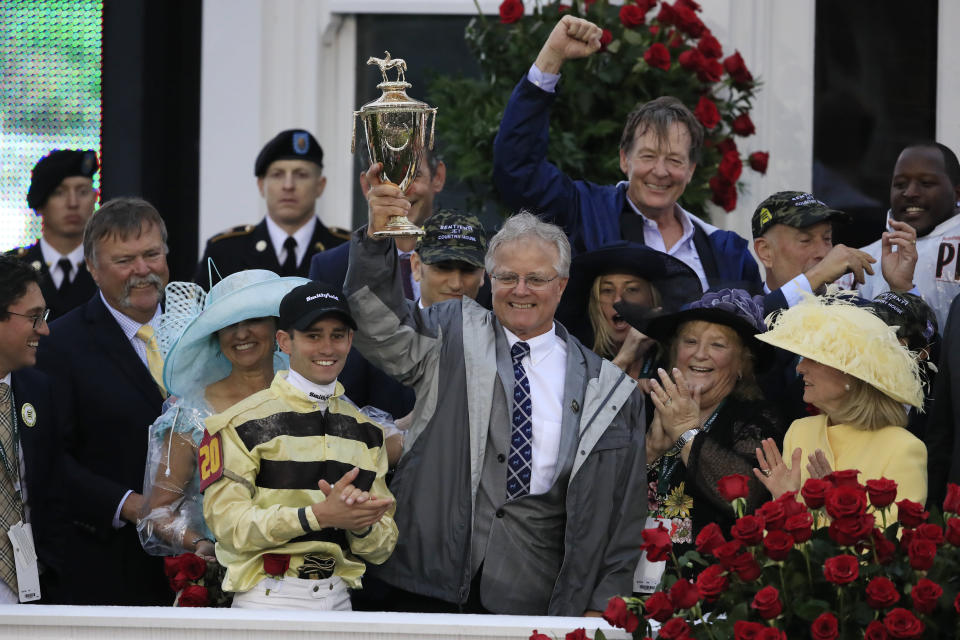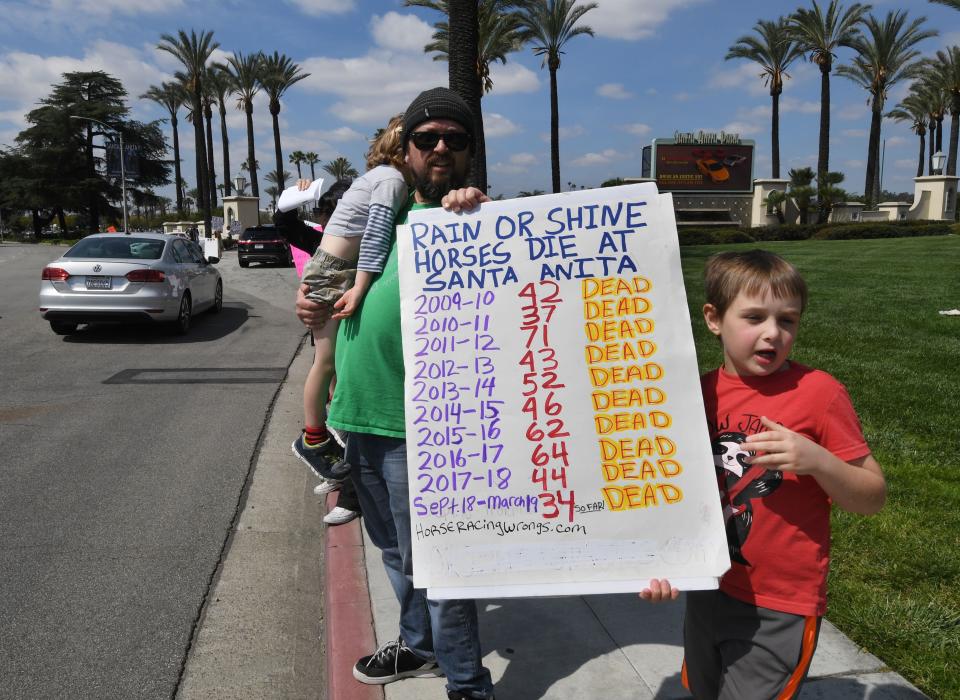Timing of Country House's withdrawal from Preakness is questionable

Country House, you’re suddenly bearing a suspicious resemblance to Ferris Bueller.
If your horse face shows up on TV from Wrigley Field on May 18, Preakness day, we’ll know for sure.
The Kentucky Derby winner-by-disqualification has a cough, according to trainer Bill Mott. That cough will sideline him for the Preakness — jarring news that follows the declaration that disqualified Derby winner Maximum Security will bypass the Preakness as well.
“His appetite is good,” Mott told the Daily Racing Form Tuesday. “He doesn't have a fever. But he's coughing. We drew blood. He's acting like he's going to get sick. He's off the training list, and if he's off the training list, he's off the Preakness list.”
Just three days after the Derby, the last gasp of air has been sucked out of this 2019 Triple Crown season. What a bust.
But here’s my question: Is Country House really sick? Or, like Ferris, is he feigning illness to get out of something he doesn’t want to do?
I don’t know the answer, but there is reasonable cause to doubt what Bill Mott is selling.
The Hall of Fame trainer has never liked the Preakness, only running in it twice, the last time in 2008. He’s based in New York, and has preferred to take his Derby runners (and other promising 3-year-olds) to the Belmont after bypassing Baltimore. He isn’t a two-races-in-two-weeks kind of guy.
The day after the Derby, Mott made it very clear that going to the Preakness didn’t thrill him. If Country House were going to run, it would be for the good of the sport and out of deference to the Triple Crown quest, a storyline that obviously relies on the Derby winner continuing on to Baltimore.
“You get shamed into it,” Mott said. “If you don’t, it’s, ‘You got no balls,’ and ‘What’s wrong with the horse?’ Having the Derby winner, you’re pretty much forced to go on to the Preakness.”The only defensible way out is to have a health excuse. Voila, here comes the cough — and a very quick Preakness hook. As one trainer pointed out to me Tuesday, this is very early to scratch a horse from a race 11 days away due to a cough. Mott could have let the situation play out for several more days before making a decision.
So now here comes a Preakness without the only two horses who truly matter. Welcome to Peak 2019 in thoroughbred racing. It’s been a disaster of a year.
This can be a supremely compelling sport, full of incredible stories both human and equine. The stars are beauty in motion. The people who work with them are a kaleidoscope of life experiences and backgrounds. The game is rife with characters, and character.
At its best, horse racing is magical.
At its worst, horse racing is the current sorry state of affairs.
Horse racing’s self-inflicted problems

From death at the racetrack to infirmities to controversy to the calendar, just about every major flaw in the game is currently on display. At the very time when the niche sport annually grabs its slice of mainstream interest, everything is going wrong.
The year began with an ongoing spate of on-track horse deaths at Santa Anita Park, one of the cornerstones of the game. From late December 2018 through March, 23 horses died — an appalling number that led to the track being closed for a time and calls for fundamental, nationwide changes to the sport.
That tempest gave way to Kentucky Derby week, always a time of excitement and anticipation within the game — and then race favorite Omaha Beach suddenly was scratched three days out, having been diagnosed with a breathing issue.
The race went on without Omaha Beach, and it seemed to produce a deserving champion in Maximum Security. He was an undefeated late bloomer who looked so pedestrian to trainer Jason Servis last December that he could have been bought for a paltry $16,000.
But then came the race objection, and the 22 minutes that will live in racing infamy as Churchill Downs stewards examined claims that Maximum Security veered out and impeded two other horses. The foul claims were upheld (correctly), although the stewards handled the situation clumsily and stoked the anger of horse owner Gary West.
That elevated long-shot Country House to first place, a 65-to-1 bomber who was not significantly interfered with by Maximum Security. For the first time anyone can remember, the Derby champion was vigorously booed when he entered the winner’s circle. The reaction seemed as out of place as booing the Master’s champion as he was slipping on the green jacket.
West followed that bitter loss with a tirade against the stewards and a declaration Monday morning that, harrumph, he’s skipping the Preakness with Maximum Security. There would be no redemption statement at Pimlico, no proving it on the track, no second matchup with Country House. The sport lost big with that decision.
But wait, that wasn’t all. Not to be outdone in dumping on the Preakness, Country House becomes the first Derby champ to miss the Triple Crown’s second leg since 1996, when Grindstone was sidelined by a bone chip in the knee.
Maybe it’s a cough. Maybe it’s Mott-induced Preakness-itis.
Triple Crown grind
To be fair, Country House had raced extensively for a modern 3-year-old thoroughbred to this point. He has competed every month, at four different tracks: a maiden race in January in Florida; the Risen Star Stakes in February and Louisiana Derby in March in New Orleans; the Arkansas Derby in April in Hot Springs; and then the Kentucky Derby in Louisville. A sixth race at a fifth track is asking a lot.
Maybe Mott felt like it was bad for the horse. Maybe he was worried that a fluke-tastic Derby winner will be exposed and embarrassed at the Preakness. Maybe there was concern about safeguarding his suddenly elevated breeding status as the Derby champion.
Or, perhaps last on the list of potential reasons: he really has a cough.
Regardless, this Preakness debacle underscores yet another of horse racing’s issues: the spacing of the Triple Crown races.
The list of trainers consistently willing to run all three legs is dwindling to the point that it’s basically just Triple Crown king Bob Baffert and a couple others. Mark Casse will be making his fourth Preakness start in the last five years. D. Wayne Lukas will always show up if he has the horses, but that’s a rarity these days.
If almost nobody wants to contest one of the three biggest races of the year, that’s a problem. And the root cause of the problem almost always is the short time frame between the Derby and Preakness — a window that doesn’t fit well into the modern thoroughbred racing schedule.
For years, there have been suggestions to spread out the Triple Crown races — move the Preakness to Memorial Day weekend and the Belmont to Fourth of July. Racing, which is both addicted to tradition and wholly lacking in unified leadership, has resisted that. The recent Triple Crown triumphs of American Pharoah and Justify have strengthened the resistance.
The Keepers of The Calendar won’t likely be overturned anytime soon. But as this Triple Crown season spirals down the drain, the sport should be painfully aware of all the systemic flaws that have made 2019 a lousy year to date.
More from Yahoo Sports:

 Yahoo Sports
Yahoo Sports 